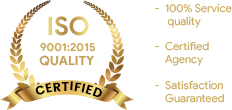Updated Guide For Boosting Website Speed
Updated Guide For Boosting Website Speed
So, do you think you’re happy with the existing conversion rates of the website? If your answer is yes then you seriously need to re-assess everything. If you think what I said doesn’t hold value, here’s something you should read:
When a webpage loading time is increased by 3 seconds, it yields:
- 5%-7% decreased conversion rates
- Decreased customer satisfaction
- 4% less views
Although there are more statistics, there’s no point of highlighting them at the moment. It’s just a matter of seconds that can determine the fate of your existing sales. Over the decade, website speed has become the highlighted feature. Since we’re provided with a speedy internet and mobile data, the expectations have risen for website speed as well. The sole disadvantage of ever-evolving technology is reduced patience and minute attention spans of users. Hence, companies had to fight for delivering things speedily.
Back in 2019, Google introduced its site shaming badges for pointing out the slow websites. It was a clear indication that site speed was regarded as a prominent ranking factor. Thus, you need to take site speed seriously in 2020 and 2021 too (and forever). Now, “HOW” would be the one-word question in your heads, right? Don’t worry, the forthcoming paragraphs have all answers.
The ‘Not-a-Rocket Science’ Evaluation
If you’re reading this line, it means you seek something better. That’s how you become responsible. Please proceed to understand how to evaluate the website like a professional.
- Understanding The Benchmark
Do you know why website designers emphasize a ? It is because can withstand the unwanted HTTP requests. Nearly 80% of the website loading time is consumed while downloading imagery, stylesheets, and scripts. With increased number of HTTP requests on every element, the webpage will take longer to load. This hassle can be countered by using a benchmark. The universal benchmark that determines the website as ‘slow’ or ‘fast’ and if the website is taking more than 3 seconds to load, it is slow.
Now, anyone would point out that desktop version is different from mobile version. That’s true but debatable because the hardware of a phone is different as compared to that of a computer. It is smaller and slower. Although the website speed can be tested on the device, it will be affected by Wi-Fi speed. Then how to evaluate site speed aptly? Website evaluation is not a tough nut to crack. It can be done considering some tools mentioned below.
A. Pingdom Website Speed Test
Pingdom is a tool used for determining the speed of the website. Using this tool, you can easily understand the number of requests made by a browser for catching the root cause of website’s slow speed.
B. GTMetrix Report
GTMetrix tool is used for everything that contributes to thepage loading speed . It analyses the generic webpage and recommends everything that needs to be improved. When you click on the element, a dropdown emerges that tells what should be done.
C. Google Analytics
Google Analytics measures the page loading time. This tool is designed to catch the slow-coaches in the website. It also helps in tracking the progress of the website soon after you start working on it.
- Quick Tips for Improving Website Speed
Never overlook some underdog modules for improving the website speed. Here’s how you can make improvements a cakewalk.
- Hosting
Website hosting is not just a requirement. It is a major factor that determines the speed of the website. Different hosting companies work on different factors based on commendable servers, content delivery system, and sturdy hosting platforms. Always choose the right hosting option.
2. HTTP Request Removal
Most of the extras are collectively found in the HTTP links. Surplus HTTP requests dampen the speed of a website. Hence, removing or eliminating the HTTP files is also a great contributor in resolving speed-related issues of the website.
3. Server Response Time Improvements
A major factor determining the page loading speed is the amount of lookup time taken by DNS. When the URL is entered in the browser, it is the DNS server that translates the URL into the IP address. Then, ISP performs the DNS lookup for locating the IP address associated with the URL.
4. Image Optimization
HQ images hold back the website and you cannot compromise with their quality. At the same time, cannot ignore website speed. Hence, images need to be optimized. Choosing JPEG images over JPG is a better option as they Google showed signs of preferring JPEG images.
5. Using CDN
Content Distribution Networks aka CDNs are server networks used for distributing content. They are used for distributing the load of content that reaches a website. Since the website copies are stored in geographically diverse data centers, CDNs assist in carrying the data smoothly to the user.
6. Minification of JavaScript, CSS, and HTML-
Minification is another underdog factor that often goes unnoticed. It is a key factor that promotes website speed. Minification is done in coding languages used for preparing the functional frame of the website. Optimizing usually means removing the unwanted spaces, commas, and other unnecessary characters.
6. Enable Compression-
The way image optimization is done; file compression is carried in the same way. By enabling compression, the size of files larger than 150 bytes is reduced.
Summarizing Up Everything
They say ‘When in Rome, Do as Romans Do’. Similarly, to increase the website rankings on Google, you need to follow the latest trends and other techniques for boosting the site speed. Boosting the site speed doesn’t happen within the blink of an eye and hence, it can be quite daunting. However, following the above-listed tips can help in polishing the website and boost its speed. Everything can be done professionally by acquiring services of website design service providers. Execute every step in a funnel because it’s a sure-fire way of accomplishing the set milestone. Focus on impacting factors that will help in shaping up rankings.
ABOUT THE ATHOR

ANKIT GUPTHA
Ankit Gupta is a self-taught digital marketing professional who loves to decode the industry’s jargons for the people entering the vast world of web. Apart from being an avid writer and sharing his thoughtful insights, he passionately follows the top web and digital marketing gurus to expand his knowledge base. He has strategized many successful digital marketing campaigns for WeblinkIndia.Net, a leading web development & designing company in India.
ADD A COMMENT
NJS Web Publishing Systems
4.8
Rating
Rate Us
Out Of
5.0
Experience
8+ years
Projects
5000+
WEB DESINING
WEB DEVELOPMENT
- Wordpress Website Development
- CMS Web Development
- PHP Web Development
- Drupal Web Development
- Joomla Web Development
DIGITAL MARKETING
- Email Marketing
- SEO Marketing
- Afilate Marketing
- Online Marketing
SPECIAL OFFER
- website Design Packages.
- SEO Packages
- PPC Package
APPS DEVELOPMENT
Android App Development
PRODUCTS
- Cart@Wpsind
- CRM@Wpsind
- ERP@Wpsind
- Classifield@Wpsind
- Jobs@Wpsind
WE ARE REVIEWED






- Home
- About Us
- Feedback
- Complaints
- Web Design Protofolio
- Mobile App Protofolio
- SEO Protofolio
- Payment Option
- Support


